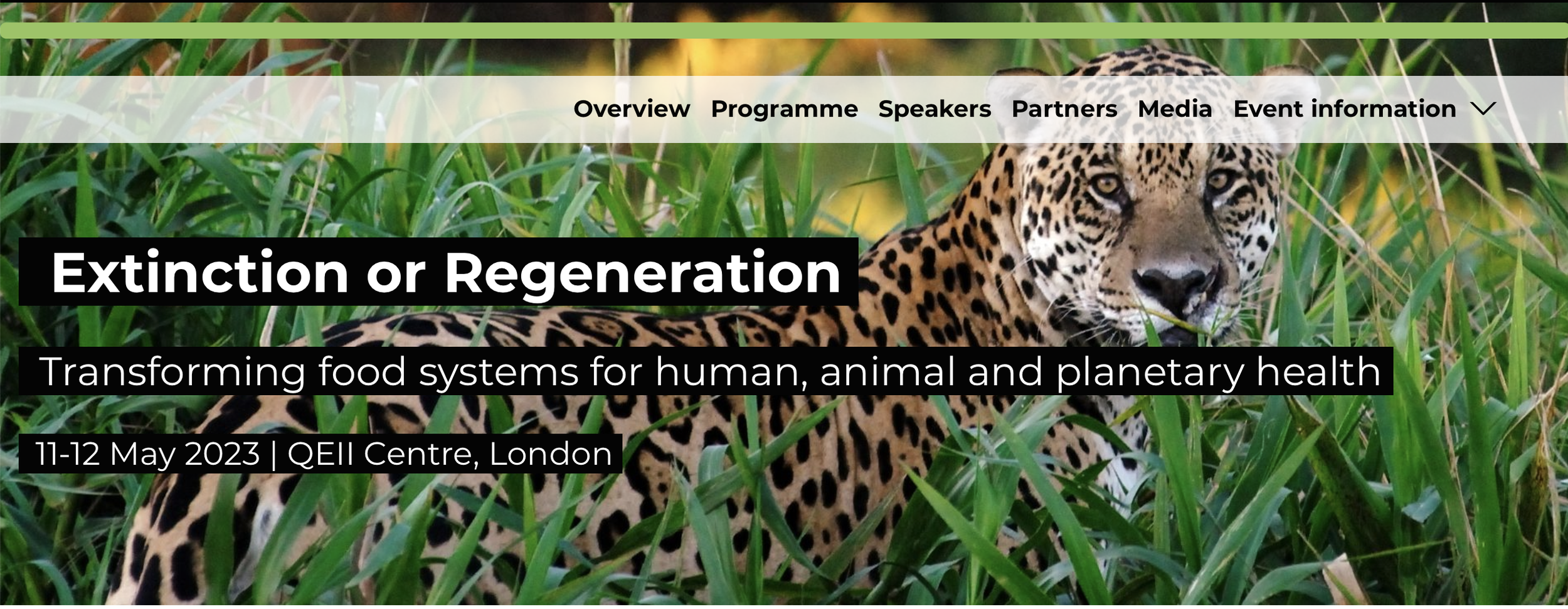
The Shamba Centre Co-founder and Director of Programmes, Oshani Perera, attended the Extinction or Regeneration conference in London. Below, the second of a two-part series where she shares her learnings and insights.
Food systems in practice: Reflections from Day 2 of the Extinction and Regeneration conference
Oshani Perera, May 2023
We grow enough food to feed the world; the problem is how we choose to use the food we grow.
Approximately 55% of the calories farmed today is consumed for human nutrients. Of the remaining calories, 36% is used as feed for the animals we farm while around 9% is used as biofuels or industrial inputs. At first glance, this might appear to be a minor predicament. But considering that farming feed for animal account for 75% of global agriculture land use, the problems begin to loom large.
Can we reduce the farming of animals and subsequently, the farming of animal feed crops?
Can we instead re-direct these resources to grow crops that will feed people?
Will this give rise to a food system that is more sustainable than the current one?
These are important questions as they lead us to the most difficult one: Who consumes the most animal-sourced foods and is thus responsible for the high carbon footprint and biodiversity loss inherent in the current global food systems?
Land and nutrition
There is indeed much injustice allocation of land for farming and the distribution of food across the world. At the conference, several presenters, including experts from the Food and Agriculture Organisation (FAO), IPES and World Resource Institute, highlighted the wide discrepancies within countries and across countries regarding the number of calories consumed and whether their composition meets the FAO recommended average minimum energy requirement of 1800 kilocalorie per day. With meat consumption increasing by about 1.7 percent per year over the last decade, the experts debated the trade-offs between food for humans versus food for animals. In many parts of the world, the per capital consumption of certain meats needs to be reduced urgently.
This then leads to the question of nutrition. Speakers were unanimous that a diet rich in plant-based foods and with fewer animal-sourced foods is better for health. But surely, those is least development countries should be eating more meat in order to meet their nutritional needs? Juxtaposing this argument was growing evidence on the availability of micro-nutrients in plant-based foods. I could not help remarking that this challenge is also a social one; meat been a part of our diet since pre-historic times, and we tend to eat more meat as our incomes rise. Hence can global societies leapfrog to balanced diets are that richer in plant-based foods instead of mimicking the habits of those with a high level of meat consumption?
Problems with animal welfare and food waste
Linked to nutrition was the debate on animal welfare. Farmed animals today represent the largest share of biomass on earth.
The ethics and irony of this uncomfortable truth is difficult to justify as we live through the 6th mass extinction of species (the last one occurred 65 million years ago). Being a long-time advocate of animal welfare, I was delighted to follow the many presentations on the link between food quality, food safety and reduced food toxicity with the humane management of livestock.
We also talked a lot about food loss and food waste with over 40% of the food we produce lost or wasted. This gave me the opportunity to highlight the findings in the Ceres 2030 Deep Dives reports on Ethiopia, Malawi and Nigeria, co-authored by the Shamba Centre co-founders, Carin Smaller and Francine Picard,which provide ample evidence ton food waste. Solutions, however, not plentiful. Despite the rise in food prices in 2021, we have not seen radical investment or citizen movements to address this problem.
Disruptive solutions?
I do not mean to imply that there is no disruption. It is true that a handful of large multinationals dominate the supply of seeds and agrochemicals and several others control the machinery, meat processing and trading. However institutional investors are assessing their environmental, social, and corporate governance strategies and scrutinising how they contribute to human nutrition, health and wellness. Nutrition is health, and the biggest causes of deaths today are non-communicable diseases. If these giant pools of capital are requesting change, will change happen faster?
We are also seeing that large food retailers and catering firms are including more plant-based ingredients on their shelves and in their menus. We also heard from food businesses that are making intelligent trade-offs: working with large supplies as well as with smaller local firms and buying meat produced from humanely farmed animals which involve higher carbon footprints due to their longer lives and natural feeds. But the companies were compensating these emissions costs by drastically reducing the emissions from transport and by increasing the energy efficiency of offices, kitchens and retail areas.
My personal highlight of the day came from the Danish Vegetarian Society’s proud story of their government’s €168 million fund to advance plant-based foods. This marks the largest investment in plant-based research and development in the EU to date. And, a €35 million five-year strategy on green proteins is under discussion to fund fermentation-made proteins, cultured meats, and a new generation of animal feed.
Sustainable food systems require that we increasingly decouple food from land. But in the race for transformative precision tech, biotech and ag-tech to reach this goal, will we give rise to a new generation of food tech giants that will dominate the global landscape in the years to come? Lest we forget, we operate in a capitalist ‘system’ where fortune favours size.
The Shamba Centre will follow up on the Extinction or Regeneration conference with four actions:
Engage with the International Panel of Experts on Sustainable Food Systems on the business case for agroecology.
Critically explore the opportunities related to precision technologies and food loss and waste.
Advocate for the eco-intensification of livestock in least developed countries with high levels of malnutrition.
Explore how more capital can flow to sustainable food business that operate in capitalist markets that favour scale and size.
Regeneration and Extinction is an event well ahead of its time. We are privilege to be a part of the movement.
